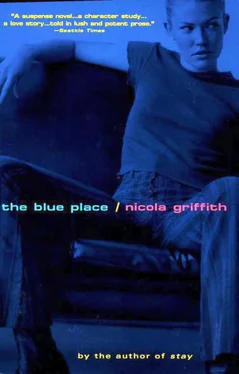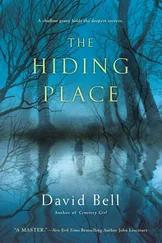It was good to feel muscle bunch and stretch in my thighs, good to thump my boots on the cement, feel its imperviousness and my strength. I checked the cars. The hood of the Corvette was cold. I looked around the back of the building. One door, unlocked. I went around to the front. The turbine in my chest began to hum. The night air felt greasy and electric on my tongue. The weather was about to change.
The front bar was shadowy. A pool table was pushed up against one wall, underneath a labouring air-conditioning unit that did not quite drown out the thump of music from the more private back room. The bartender polished glasses and concentrated hard on not seeing the three men in the far booth. I leaned against the bar near him, shook my head when he lifted his eyebrows.
Buddy Collins was the kind of man who looked as though his neck was too thin for his shirt collar, though it and the expensive jacket fit perfectly. An untrained witness would probably not be able to describe him as other than a slimeball. Buddy Collins had fooled even trained witnesses—of which he had been one, once.
Right now, Buddy Collins was swallowing a great deal. He was pressed up against the wall on the inside of the booth by a man who had his back towards me. That man had his hand resting on Collins’s forearm. It was a very big hand. Equally big legs were jammed under the booth table; he wouldn’t be able to move out fast. He was leaning forward, talking at Collins. The one on the other side of the booth was mean and whippy-looking. He was trying to clip the end off a cheap cigar, and listened with only half an ear to the big man. He had heard it all a thousand times before.
“I can’t,” Collins said. “Not all of it. Not tonight.” The big man said nothing. “If you could just give me—”
The big man hit him, just a slap, but it was loud, and a bead of blood formed in the corner of Collins’s mouth.
“Gentlemen,” I said, moving in. They all swung around, astonished. “Don’t damage Mr. Collins too severely. He has some information I need.”
“You some kind of weirdo?” the big man asked, and turned back to his conversation with Collins without waiting for an answer.
The whippy one, who seemed to have clipped the end of his cigar to his satisfaction, pulled out a book of matches. “Butt out, lady.” He put the cigar in his mouth and struck the match. His eyes crossed in concentration. I hit him, twice, on the left temple, right hand left hand, and without pause stepped backwards and put all my weight behind an elbow strike to the big man’s nose. It burst like a piñata and spilled brightly, and he screamed, so I let my arm follow its automatic one-two training and hit him again, this time a knife-hand chop to the forehead. He sighed and slumped over the table.
The cigar was still hanging from Whippy’s mouth. “Do I need to hit you again?”
He did not seem to hear. I looked at Collins and gestured at the big man, draped all unconscious across the bench and table. “Can you squeeze past or should I pull him out?”
“I’ll manage.” He climbed up onto the table.
I turned to the bartender. He backed up a step. “There’s nothing much wrong with them, but you might like to have an ambulance here soon, get them taken off your hands. They won’t be very happy when they wake up.”
“You—” He cleared his throat, then thought better of it and just nodded.
Collins jumped down from the table. “Time to get out of here.”
In the parking lot, he looked around. “Which is your car?”
“We’re taking yours. I’ll drive.”
“Look, Torvingen. That car’s my pride and joy—”
I held out my hand. He stared at me then yanked keys from his pocket, slammed them into my hand, and went round to the passenger side. The car smelt of dirty leather and coffee. He watched me sideways as we pulled onto Cheshire Bridge.
“What?”
“Nothing. Just wondering why you suddenly appeared, where you’re taking me, things like that.”
“We’re going to have a nice talk. You’re going to tell me a few things I want to know.”
“Jesus, Torvingen, you’ve screwed up everything. Those two guys won’t take kindly to you—”
I pulled into the Cheshire Strip lot and killed the engine. “You owe them money. You’ve defaulted. They seemed about to get very unhappy. I’ve just accelerated the process a little. I’m sure you’ll think of something.” Collins had been a Vice cop until his spending had led to such excessive graft that even the APD could no longer turn a blind eye. He had been turned out when I was a rookie. Now he earned his money selling information from one street interest to another, and sometimes to law enforcement.
“You’re not on the force anymore,” he said.
“No. So now I can afford to pay more.”
“I don’t like you.”
“You don’t have to like me. Just tell me about the burn in Inman Park five days ago. Who ordered the job? Was the victim, an art appraiser called Lusk, known? And where does the big money go these days?” The Big Money, the money raised from the wholesale dealers who sold to midlevel hustlers.
He reached up and turned on the dome light. “You don’t have the money for that last answer. And if you did, and I told you, I’d never live to enjoy it.”
His eyes were still shifting, but he wasn’t swallowing. A quick cost-benefit analysis of forcing him was not promising: he probably didn’t know. “Fine. Then tell me who would be capable of this burn. Bertolucci didn’t recognize it. How do I find them, and who have they worked for in the past?”
“How much?”
“How much do you think it’s worth?”
“Two thousand.”
“I’ll give you five hundred.” I pulled the money out of my pocket and counted off five hundreds but didn’t hand it over.
“Guy from Boston. You don’t know him.”
“Name.”
“I don’t know his name! He’s just some technician hired in, like you’d pay someone to check your brake fluid.” He was getting agitated.
“Then tell me who he worked for.”
“Arellano.” He practically spat it out.
Arellano. The Big Money man of two years ago, the representative of the Tijuana drug cartel here in the South. Only no one had been able to prove it. “He’s been dead for two years.”
“This technician worked for him two years ago.”
“I don’t know what you’re telling me here, Buddy. Did the technician work this time for Arellano’s replacement?”
“Maybe.”
“‘Maybe’ doesn’t cut it.”
“This time he worked for a guy who might work for the guy who took over from Arellano. Okay?”
“What do you mean by ‘might work for’?”
“The guy washes money. He washes a lot of money. He hired the technician.”
“Give me his name.”
“I don’t know his name.”
I was pretty sure I did. “Another hundred if you tell me why he paid the technician.”
He hesitated, craned his neck to try to look up the road. “Another two hundred.”
“One hundred.”
He touched the blood at the corner of his mouth with a fingertip and sighed. “The fire was to clean up some evidence.”
“And did the evidence get cleaned?”
“A guy died.”
“That’s not what I asked.”
His eyes shifted.
“The truth, Buddy. If you don’t know, just say so and you get to keep fifty.”
“I heard some of the evidence is still walking around. But the technician got paid, okay? And no one is pissed off, and no one is talking about trying again. So it doesn’t make sense, okay?”
It made perfect sense to me, or part of it did. Julia was no longer important: she had no evidence and, after lying to the insurance investigator, no one would even begin to believe her without it. With the painting gone, Honeycutt thought he was safe. The question is, what was a money launderer doing dabbling with fake art? It was a stupid extra risk. That made no sense. Nor did the drugs on the scene.
Читать дальше












